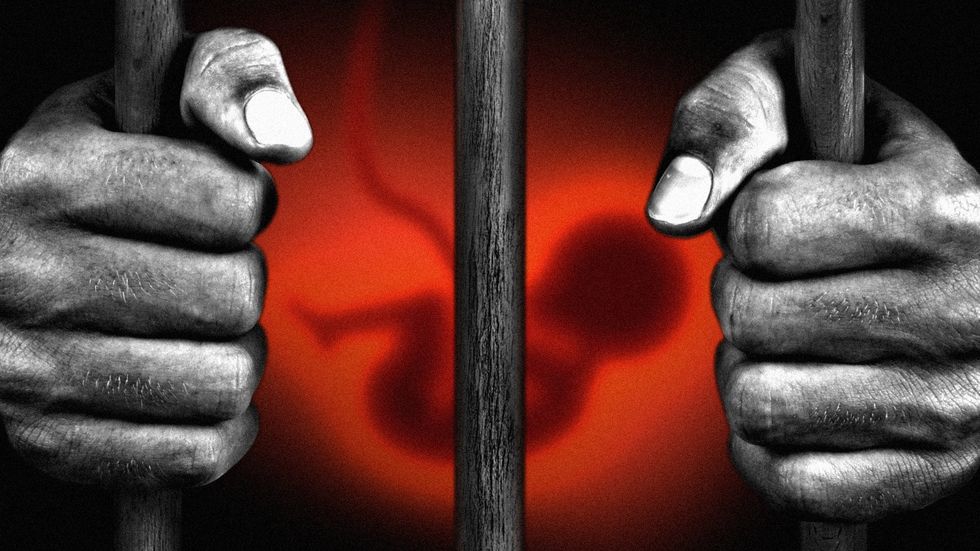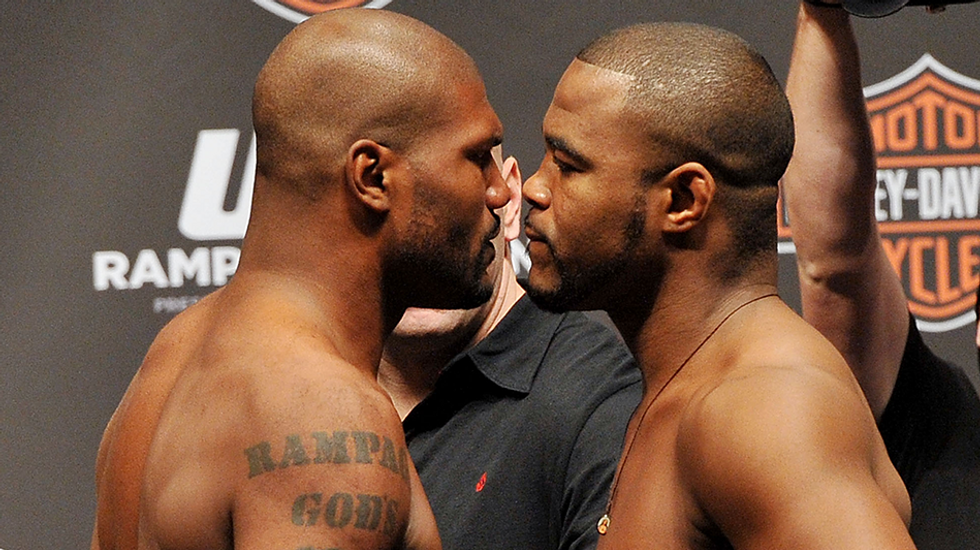Marcellus Williams’ case exposes the left's hypocrisy on death row and abortion
Corporate media's coverage of Marcellus Williams' recent execution serves as yet another reminder that it is the leading source of misinformation and moral confusion in America today.News outlets, liberal social commentators, and civil rights organizations claimed the state of Missouri “lynched” and “murdered” Williams, a man they claim was proven “innocent” by DNA evidence. What they failed to report was that “DNA on the murder weapon belonged to an assistant prosecuting attorney and an investigator who had handled the murder weapon without gloves prior to trial.” The problem with our culture's view of justice is that it’s man-made, materialist, and functionally Marxist.The facts of the case are publicly available, but reading through court documents is a waste of time when you feel you’re doing the righteous work of speaking up for the falsely accused. Williams was convicted in a 2001 trial for the brutal murder of Felicia Gayle on August 11, 1998. She was stabbed 43 times, and her belongings were stolen. The victim's personal items were found in the trunk of the car Williams had been driving. Williams sold the laptop to a man named Glenn Roberts within days of the murder. Williams confessed to killing Gayle, both to his girlfriend shortly after the murder and also to an inmate in a St. Louis jail. I understand that reasonable people have different views on the death penalty. Some argue that the state should never take the life of a citizen, even if the person is proven guilty beyond a reasonable doubt. Others point out that capital punishment disproportionately affects black inmates, especially when the victim is white. Some believe the possibility of executing even one innocent person is reason enough to abolish it.Progressives opposed the death penalty in Marcellus Williams' case for the reasons mentioned earlier, arguing it's immoral and wrong to execute an innocent man. I agree, and it would be a true miscarriage of justice if new evidence proving his innocence were to come to light.But progressives who are both death penalty abolitionists and abortion absolutists are the last people who should be lecturing anyone about taking innocent life. The people most likely to bring up rape and incest in the abortion debate have an inverted moral compass that leads them to have more compassion for convicted criminals than preborn babies. Pro-life conservatives often face the question of why they oppose abortion but support capital punishment. The question deserves a clear response. A pro-life worldview asserts that human life's value is inherent, regardless of age, sex, race, education, disability, or even criminal background. The source of this value is our Creator. Genesis 1:27 affirms that men and women are made in God's image, while Genesis 9:6 connects the value of life to the penalty for intentionally taking one: “Whoever sheds the blood of man, by man shall his blood be shed, for God made man in his own image.”This may be difficult for many people to accept, but one practical way to determine the value of something is the cost that must be paid when it is destroyed. Accidentally dropping a carton of eggs will cost a few dollars to replace and the time it takes to clean the mess. Intentionally destroying a Fabergé egg, however, would cost far more — both millions in value and a possible criminal charge. The same holds true in our criminal justice system. The penalties for theft and assault are different than those for rape and murder. The federal government and some states believe there are some crimes so heinous that the people who commit them must pay the ultimate cost. The pro-life perspective on capital punishment does not violate the principles of justice, despite progressive objections. “An eye for an eye” and “a life for a life” are morally just because the punishments match the crime. Worse alternatives — like responding to an eye with a head or a life with an entire family — demonstrate the importance of proportional justice. True justice requires a proper moral framework.As Leviticus 19:15 instructs: “You shall do no injustice in court. You shall not be partial to the poor or defer to the great, but in righteousness shall you judge your neighbor.”The problem with our culture's view of justice is that it’s man-made, materialist, and functionally Marxist. Liberal social commentators and policymakers often see the world through the lens of an oppressed-oppressor binary. While this worldview is linked to "social justice," it doesn’t determine innocence or guilt. True justice transcends categories like black, white, blue, red, or green.Democrats see the disproportionate number of black men on death row and assume racism drives our legal system. Yet, they see the disproportionate number of black babies killed in the womb and call it “empowerment.” I understand complicated feelings about capital punishment, but I won’t accept lectures from anyone who opposes the death penalty for everyone except the p


Corporate media's coverage of Marcellus Williams' recent execution serves as yet another reminder that it is the leading source of misinformation and moral confusion in America today.
News outlets, liberal social commentators, and civil rights organizations claimed the state of Missouri “lynched” and “murdered” Williams, a man they claim was proven “innocent” by DNA evidence. What they failed to report was that “DNA on the murder weapon belonged to an assistant prosecuting attorney and an investigator who had handled the murder weapon without gloves prior to trial.”
The problem with our culture's view of justice is that it’s man-made, materialist, and functionally Marxist.
The facts of the case are publicly available, but reading through court documents is a waste of time when you feel you’re doing the righteous work of speaking up for the falsely accused.
Williams was convicted in a 2001 trial for the brutal murder of Felicia Gayle on August 11, 1998. She was stabbed 43 times, and her belongings were stolen. The victim's personal items were found in the trunk of the car Williams had been driving. Williams sold the laptop to a man named Glenn Roberts within days of the murder. Williams confessed to killing Gayle, both to his girlfriend shortly after the murder and also to an inmate in a St. Louis jail.
I understand that reasonable people have different views on the death penalty. Some argue that the state should never take the life of a citizen, even if the person is proven guilty beyond a reasonable doubt. Others point out that capital punishment disproportionately affects black inmates, especially when the victim is white. Some believe the possibility of executing even one innocent person is reason enough to abolish it.
Progressives opposed the death penalty in Marcellus Williams' case for the reasons mentioned earlier, arguing it's immoral and wrong to execute an innocent man. I agree, and it would be a true miscarriage of justice if new evidence proving his innocence were to come to light.
But progressives who are both death penalty abolitionists and abortion absolutists are the last people who should be lecturing anyone about taking innocent life. The people most likely to bring up rape and incest in the abortion debate have an inverted moral compass that leads them to have more compassion for convicted criminals than preborn babies.
Pro-life conservatives often face the question of why they oppose abortion but support capital punishment. The question deserves a clear response. A pro-life worldview asserts that human life's value is inherent, regardless of age, sex, race, education, disability, or even criminal background.
The source of this value is our Creator. Genesis 1:27 affirms that men and women are made in God's image, while Genesis 9:6 connects the value of life to the penalty for intentionally taking one: “Whoever sheds the blood of man, by man shall his blood be shed, for God made man in his own image.”
This may be difficult for many people to accept, but one practical way to determine the value of something is the cost that must be paid when it is destroyed. Accidentally dropping a carton of eggs will cost a few dollars to replace and the time it takes to clean the mess. Intentionally destroying a Fabergé egg, however, would cost far more — both millions in value and a possible criminal charge.
The same holds true in our criminal justice system. The penalties for theft and assault are different than those for rape and murder. The federal government and some states believe there are some crimes so heinous that the people who commit them must pay the ultimate cost.
The pro-life perspective on capital punishment does not violate the principles of justice, despite progressive objections. “An eye for an eye” and “a life for a life” are morally just because the punishments match the crime. Worse alternatives — like responding to an eye with a head or a life with an entire family — demonstrate the importance of proportional justice. True justice requires a proper moral framework.
As Leviticus 19:15 instructs: “You shall do no injustice in court. You shall not be partial to the poor or defer to the great, but in righteousness shall you judge your neighbor.”
The problem with our culture's view of justice is that it’s man-made, materialist, and functionally Marxist. Liberal social commentators and policymakers often see the world through the lens of an oppressed-oppressor binary. While this worldview is linked to "social justice," it doesn’t determine innocence or guilt. True justice transcends categories like black, white, blue, red, or green.
Democrats see the disproportionate number of black men on death row and assume racism drives our legal system. Yet, they see the disproportionate number of black babies killed in the womb and call it “empowerment.” I understand complicated feelings about capital punishment, but I won’t accept lectures from anyone who opposes the death penalty for everyone except the preborn.
Originally Published at Daily Wire, World Net Daily, or The Blaze
What's Your Reaction?
































































































